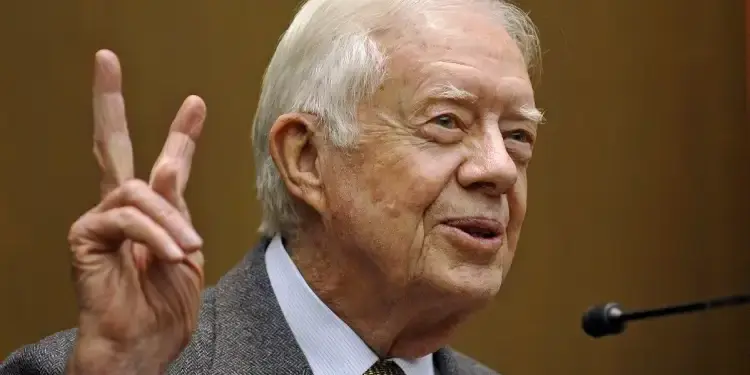The disappearance of Jimmy Carter at the age of 100 turns a major page in American diplomacy, marked by decisive commitments in the Middle East and North Africa. From the Historical Camp David agreement in 1978, which transformed Israeli-Egyptian relations, to his role as an observer in the Tunisian democratic transition in 2014, the former American president leaves a legacy of almost four decades of commitment to peace and democracy.
The Camp David agreements, signed under his presidency (1977-1981), are often presented as the greatest diplomatic accomplishment of Jimmy Carter. By intense mediation between Anouar El-Sadate and Menahem Begin, he supervised the first official recognition of Israel by an Arab State. However, this agreement, although marking a turning point in Israeli-Egyptian relations, was criticized for having served mainly the interests of Israel. By obtaining normalization with Egypt and the restitution of Sinai, Israel has strengthened its regional position while avoiding any real discussion on the rights of the Palestinians or on the cessation of colonization, which was already intensified at that time.
After his mandate, Jimmy Carter continued a bold diplomacy and often breaking with the official line of the United States. In 2006, the publication of “Palestine: Peace not apartheid” sparked a keen debate. By comparing the condition of the Palestinians to South African apartheid, he drew attention to an often elected issue, while aroused many controversies in American political and diplomatic circles.
Carter’s commitment was not limited to the Israeli-Palestinian conflict. In Tunisia, in the post-revolutionary context of 2011, he played an essential role through the Carter Center. The organization supported the adoption of the new Tunisian Constitution in 2014, an event greeted as a crucial stage for the young democracy. “By adopting a new constitution in a spirit of peace and consensus, Tunisia sent a message of hope to the nations in search of freedom and democracy,” said Jimmy Carter.
During the 2014 Tunisian elections, the Carter Center deployed international observers, strengthening the transparency and credibility of the electoral process. For Carter, the Tunisian experience represented an inspiring model for other countries in transition, illustrating the possibility of a peaceful and democratic transition in a region often marked by instability.
In addition, Lebanon was also a priority for Carter, which spoke several times on the civil war which ravaged the country between 1975 and 1990. In 1978, it firmly criticized the Israeli military intervention, warning the consequences of prolonged foreign occupation on regional tensions. True to his principles, he saw in dialogue and justice the only ways to appease conflicts.
Crowned by the Nobel Peace Prize in 2002, Jimmy Carter embodied diplomacy with a human face, guided by an unshakable commitment to peace, justice and human rights. From Camp David to the Tunisian elections, he leaves an indelible heritage, where the quest for peaceful solutions has always awarded the divisions.








